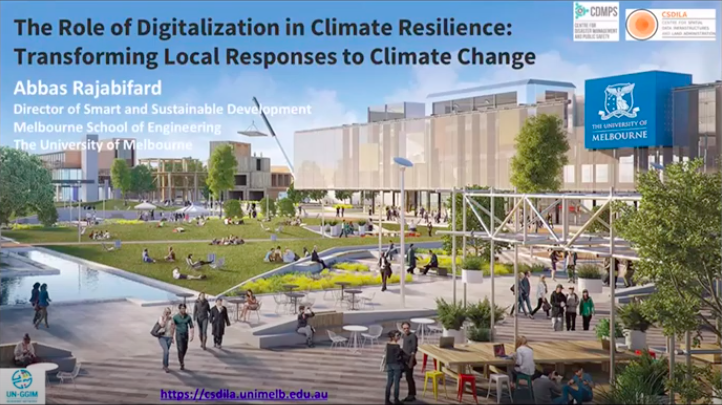
In order to access the video, you must create an account on Daringcities.org or log-in.
Digital transformation is increasingly altering all aspects of society, offering new ways to produce, consume, and live. It is well-established that digitalization can contribute to climate change mitigation. However, it can also improve adaptation capacity and pave the way for innovative, larger scale and transformative adaptation measures.
Digital tools are useful for wide range of activities, such as understanding climate data, assessing variability, predicting extreme weather events, or climate change’s socio-economic impacts. They can also enable an efficient, transparent, decentralized decision-making processes, while also supporting decision-making processes at the sub-national governments. By addressing conventional challenges in an unconventional way, digitalization can boost adaptation capacity and climate resilience for communities in both more and less developed regions.
During this session, panelists from different backgrounds and sectors discuss current knowledge on the opportunities digitalization can bring to the table, but also highlight the challenges that need to be considered from a social-ecological-technological systems perspective. In addition, a number of replicable examples of adopting digitalization tools to enhance climate resilience in local levels (both from Global South and Global North) are showcased. Viewers will find this session not just informative, but also insightful and inspiring.
Speakers:
- Prof. Abbas Rajabifard, Professor and Discipline Leader, Chair of the United Nations Global Geospatial Information Management (UN-GGIM) Academic Network, Director of the Centre for Disaster Management and Public Safety (CDMPS), University of Melbourne, Australia
- Elaine Trimble, Independent Thought Leader and Former Director of Urban Development, Siemens Global Centre of Competence for Cities, London, UK
- Dr. Miroslav Polzer, Executive director, International Association for the Advancement of Innovative Approaches to Global Challenges IAAI, Klagenfurt, Austria
- Prof. Danny Marks, Assistant Professor, Dublin City University, Ireland
- Moderator: Pourya Salehi, Research Officer, ICLEI, Bonn, Germany
